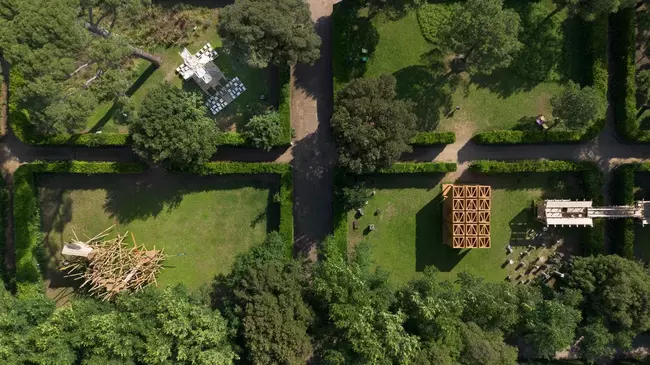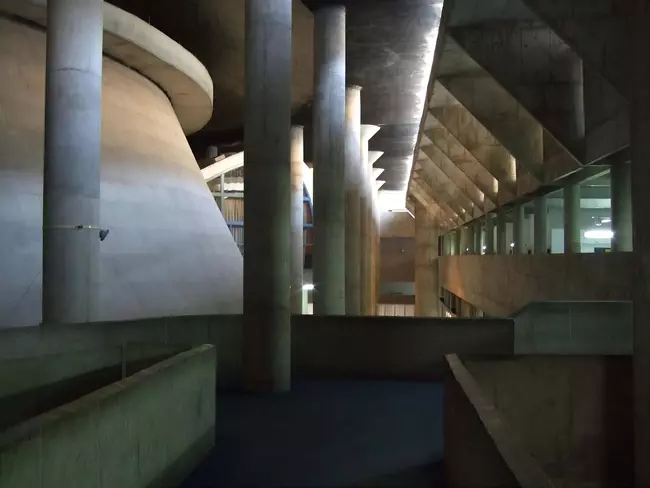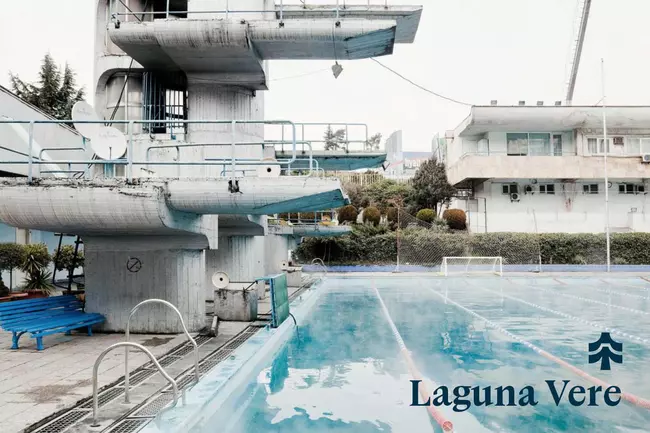- ConcoursSite Internet
DeadlinePublié le 09/02/2024
The European Prize for Urban Public Space
© WBA The European Prize for Urban Public Space is an initiative of the Center of Contemporary Culture of Barcelona (CCCB) which, since 2000 and on a biennial basis, recognizes the best interventions of creation and transformation in the public spaces of European cities.
The Prize has an honorary nature, is awarded jointly to the authors and promoters of works carried out in the 47 countries that make up the Council of Europe and gives the maximum dissemination to the selected works through the network of European collaborators and partners of the project.
The Prize offers a unique perspective on European cities and aims to become a space of reference to discuss the challenges of urban public space, in collaboration with experts and architectural, academic, and cultural institutions from all over the European territory.
Throughout its 24-year history and 11 editions, 2,507 works have been submitted to the Prize. A selection of the best 382 works from all editions is published on the project's website (www.publicspace.org). (www.publicspace.org).
PUBLIC AND URBAN SCAPE
The European Prize for Urban Public Space has the natural space in the European city that, despite its diversity, shares some common historical elements, such as human scale, compact design and a mixed-use character. In this idea of the European city, public space plays a key role in collective encounters, loaded of political, economic and social values that are inseparable from a physical design that accommodates them and makes them possible. In this way, the Prize, from the observation of the quality of public spaces, also becomes a project that generates attention and reflection on the quality of life and the democratic quality of European cities.The cities of Europe are facing challenges and transformations that cross the urban reality around the world. From this perspective, the Award proposes a specific look from our most immediate reality to a debate on the future of cities that is global, and that, in a progressively urbanized world, is gaining more and more importance every day. To think the European city is to think about concrete solutions that are being given today in Europe to respond to the global challenge of the urban future.
Today, the climate emergency has transformed global agendas, has added more challenges to the current social problems in our cities and has become a central vector of urban thinking. Issues such as shortages, inequalities, mobility, migrations or emergencies place cities in front of challenges for which there are still no clear answers and which have a direct impact on urban design and public spaces, due to their clearly social or public function. In addition, the impact of technological transformations is an element that can also directly intervene in the urban realities of the surrounding area.
The Award aims to reflect the centrality of these issues and to become an observatory of good practices that will allow us to think of possible solutions for a future in which cities will play a key role in defining the evolution of society. It is a unique award in Europe, as it promotes a space that is both public (open and universally accessible) and urban.
AIM OF THE PRIZE:12THAWARD (2024)
The CCCB announces a new edition of the European Prize for Urban Public Space.In this year’s award, the Prize has two distinct categories.
General category
The general category aims to evaluate interventions in public space which took place between 2022 and 2023 with the exception of projects related with transformation of seafronts.
Presentation for the Prize is open and free of charge, and the procedure consists of two rounds. In the first round, the Jury will select 25 works to be published on the Prize website and included in its online archive. Five finalists, selected from these 25 projects, will continue to the second round.
In the second round, the Jury will consider the finalist works in accordance with the terms and conditions set out herewith. As a result of this second round, the Jury will name the winner of this category.
Seafront category
Given the challenges faced by cities that are open to the sea as a consequence of the climate change, this category aims to assess projects of transforming, recovering, and creating seafronts over the last five years, from 2019 to 2023 inclusive.
Presentation for the Prize is open and free of charge, and the procedure consists of two rounds. In the first round, the Jury will select 5 finalists in this category. These will be published on the Prize website and will be included in its online archive.
In the second round, the Jury will name the winner of this category.
ADVISORY COMMITEE
The Award has an institutional network around Europe that allows to consolidate the project throughout the territory and to guarantee recognition of the most outstanding works of intervention in public space.The institutions that are part of the Advisory Committee for this year's edition are:
Arc en rêve (Bordeaux), ArkDes (Stockholm), Architekturzentrum Wien (Vienna), Cité de l’Architecture et du Patrimoine (Paris), CIVA (Brussels), Deutsches Architekturmuseum (Frankfurt), Eesti Arhitektuurimuuseum (Tallinn), Kortárs Építészeti Központ (Budapest), Muzej za Arhitekturo in Oblikovanje (Ljubljana) and The Architecture Foundation (London).JURY
The Jury for this year’s Prize consists of eminent professionals from all over Europe, namely:President:Beth Galí. Architect (Barcelona)
Members:
Sonia Curnier. Architect, École Polytechnique Fédérale de Lausanne (Switzerland)
Fabrizio Gallanti. Architect and curator, director of arc en rêve (France)
Žaklina Gligorijević. Architect and urban planner (Serbia)
Beate Hølmebakk. Architect and cofounder of Manthley Kula (Norway)
Manon Mollard. Architect and editor of The Architectural Review (United Kingdom)
Francesco Musco. Architect and urban planner, Università Iuav di Venezia (Italy)Secretary:Lluís Ortega, Architect (Barcelona)
The jury will consider only those entries that comply with the terms and conditions of participation established in these rules and may declare the competition void. The secretary will assist the jury and will take the minutes of the sessions during the voting process.
EVALUATION CRITERIA
The jury will evaluate those proposals that best respond to the emerging challenges of public space and will take into account the incidence of the urban transformation in its specific context and its impact on collective life, from a cultural, social and environmental perspective. The evaluation will consider the following criteria:- Architectural and urban planning quality of the built-up area.
- Public ownership and/or clearly public vocation of the project.
- Multidisciplinary nature of the designing/promoting team including, in addition to architectural and urbanistic aspects, inclusion of many kinds of expertise and sensibilities with regard to public space.
- Explicitly urban nature of the intervention. The dimension of the work is not a factor that should be taken into account per se but projects located in large or medium-sized cities and towns or significant urban centres will be evaluated.
- Appropriateness in terms of civic functions required of urban space, both those pertaining to appropriation of space by citizens and those related to the collective imaginary and preservation of historic memory.
- Innovative responses to climate conditions and contribution of environmental improvements with regard to mobility and sustainable use of resources.
- Capacity of works for reducing segregation of uses and the social inequalities that are present in the urban setting, and elimination of physical and/or symbolic barriers.
- Impact of works on city limits and their ability to foster harmonious relationships with peripheral areas and the most immediate natural environments.
- Capacity of works to generate debates on the limits of public space with regard to both formal and functional aspects of the relationship with adjoining spaces.
- Ability to strengthen urban resilience to climate change.
CONDITIONS OF PARTICIPATION
General category:
Eligible to present for the Prize are works of creation, recovery, and improvement of public space, completed between 1 January 2022 and 31 December 2023 (both dates inclusive), and located in the geographical area of the Council of Europe at the time of presenting for the Prize.
Seafront category:
Eligible to present for the Prize are works of creation, recovery, and improvement of seafronts, completed between 1 January 2019 and 31 December 2023 (both dates inclusive), and located in the geographical area of the Council of Europe at the time of presenting for the Prize.
The list of member states of the Council of Europe may be consulted at this link:https://www.coe.int/en/web/portal/46-members-states
Since some urban planning interventions have very long periods of implementation, a work may still be eligible to present for the Prize even when it is not totally finalised during the period indicated if enough phases of the work entailed have been completed to enable evaluation of what the urban effects of the project would be in its totality.
Works can be presented for the Prize by authors or promoters in the clear understanding that both parties consent to the registration process and inclusion of their respective personal data.
FORM OF PRESENTATION
The registration of works for both categories opens on5 March 2024at 12 noon (GMT +1) and closes on16 April 2024at 12 noon (GMT +1). Registration is to be done exclusively online by means of an electronic form that is available at the Prize website: www.publicspace.org.
Participation of a work in one category automatically excludes its participation in the other. When starting the registration process, the participant will have to decide in which of the two categories the work is to be presented.
Once the registration form for a work has been completed and the registration code obtained, participants can modify or add to the form as often as they wish until the registration period ends.
Participants who present more than one project must complete the online registration process for each one of the works.
Detailed instructions on registration may be found in the guide that is available at the Prize website: www.publicspace.org.
Documentation
When registering, candidates for the Prize must supply the following information:
- Title of the work, in the original language and its translation into English.
- Technical file of the work.
- Credits: authors, promoters, collaborators
- A minimum of 10 and a maximum of 20 digital images (photographs, drawings and plans), in .jpg or .png format with a minimum length of 2000pixels on its long side and a maximum weight of 3MB per image, and the photographs' credits.
- Descriptive report in English divided into four chapters: state prior to the work, aim of the intervention, description of the intervention and final evaluation. Each chapter should be between 800 and 1200 characters long (with spaces).
SELECTION PROCESS
1st round: Selected works and finalists
The processes of selecting the prize-winning works and their respective calendars will differ depending on the category in which the work is registered.
General category:
- Selected works: The Jury will consider all registered entries and will name the 25 most highly rated projects.
- Finalist works: The Jury will select 5 finalists from among the 25 selected works and these finalists will continue to the second round.
DATES
5 MarchRegistration period opens at 12 noon (GMT+1)16 AprilRegistration period closes at 12 noon (GMT+1)27 and 28 JuneJury meeting to choose selected works and finalists from the general category and finalists from the seafront category1 JulyAnnouncement of selected works and finalistsSeptemberPresentation of the five finalist works in the seafront category at a public event in Barcelona28 OctoberPresentation of the five finalist works in the general category in a public event at the CCCB29 OctoberFinal decision made by the Jury and awards ceremony for both categories of the Prize

Wallonie-Bruxelles Architectures est une agence de promotion culturelle et économique des architectes de Bruxelles et de Wallonie sur la scène internationale.



